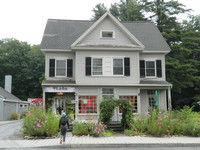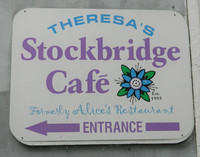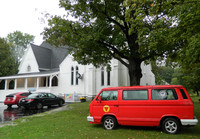By Steve Bergsman
From the 1950s through the 1960s, as folk music evolved into folk-rock and beatniks morphed into hippies, there were two important nodes of hipsterdom on the East Coast: New York and Boston. However, not all the longhair recusants wanted to live in urban areas. Some preferred the organic ambience of the country, and between the two metros were the beautiful Berkshire Mountains and in particular the inviting hamlet of Stockbridge.
The town became famous because of the ever-popular blues-talk song "Alice's Restaurant" by Arlo Guthrie that rambled on seemingly forever but really did end before the 20-minute mark. I don't mean to be dismissive because the 1967 song, officially known as "Alice's Restaurant Masacree," and its origins are still important to Stockbridge.
I'll discuss that at length shortly, but before I do I want to make reference to another song that always pops into my head whenever I hear the word "Stockbridge," and it's from James Taylor's second album, "Sweet Baby James" in 1970. The tune to which I'm referring is the title song. The lyrics, which I've never forgotten, go like this: "Now the first of December was covered with snow / And so was the turnpike from Stockbridge to Boston / Lord, the Berkshires seemed dreamlike on account of that frosting / With ten miles behind me and ten thousand more to go."
Recently my wife and I ignored "the turnpike" and drove the country roads from coastal Connecticut to Stockbridge. We arrived in a drizzling rain, which for some strange reason has always been the weather when we have visited the town in the past.
Stockbridge is an old burg, dating from the early 1700s. Colonial homes and inns are still around, particularly the Red Lion Inn, which dominates the few mercantile establishments that one could call downtown. It is here where Guthrie's story of a garbage dump gone wrong begins. According to the song, his friends Alice and Ray owned an eatery in Stockbridge, which is referred to as Alice's Restaurant.
At the beginning of a small alley off of Stockbridge's Main Street look up and you'll see a sign that reads "Theresa's Stockbridge Cafe formerly Alice's Restaurant" with an arrow that points left, down the alley. The day I was there a sign on the door read "Closed" and from the growth of the vines surrounding — and now obscuring — parts of the door, it looked closed for a long time. That alley is now called Alice's Avenue.
I should point out one more establishment in Stockbridge, a woman's boutique called Vlada, located in what once was an old residence. While my wife was trying on clothes I got to talking to the saleswoman, who told me the store was originally opened in 1970. I asked, "Was Vlada a hippie?" The woman thought for a moment before responding, "More of a beatnik."
In "Alice's Restaurant" the protagonist of the song gets arrested for illegal dumping, and this is how the incident is introduced: "I want to tell you about the town of Stockbridge, Massachusetts, where this happened here. They got three stop signs, two police officers, and one police car, but when we got to the Scene of the Crime, there was five police officers and three police cars, being the biggest crime of the last fifty years."
One other important line from the song: "But Alice doesn't live in the restaurant; she lives in the church nearby the restaurant, in the bell tower with her husband Ray and Facha, the dog."
Alice and Ray lived in the decommissioned Trinity Church of Great Barrington, which Guthrie bought in 1991 and transformed into the Guthrie Center, a community center that brings services to those who are in need. The center offers free community lunch one day a week and free legal advice, tutoring and yoga. It's also a religious center, or as George Lay, who manages the Guthrie Center, says, it's a "bring your own God church."
The Guthrie Center hasn't lost touch with its Arlo roots, and it sells "Alice's Restaurant" and Guthrie family (Arlo's father was folksinger Woody Guthrie) memorabilia and books. It also hosts a Wednesday night hootenanny and boasts a guest-artist schedule during the summer months called The Troubadour Series. The lineup is heavy on folksinger-types, including old Greenwich Village stalwarts such as Tom Rush, Tom Paxton, and Jim Kweskin and Geoff Muldaur.
Although the song is more than 50 years old, people remember it fondly. Lay says during the summer months visitors from all over the world crowd into the center looking for Alice and Ray, Arlo, Officer Obie or perhaps their lost youth. As the song says: "You can get anything you want at Alice's Restaurant."
WHEN YOU GO
From New York to Stockbridge is about 140 miles, from Stockbridge to Boston 131 miles. The "turnpike" in the song is Interstate 90.



Steve Bergsman is a freelance writer. To read features by other Creators Syndicate writers and cartoonists, visit the Creators Syndicate website at www.creators.com.
What today is the Guthrie Center in Stockbridge, Massachusetts, was once the home of Alice and Ray, who were mentioned in the song "Alice's Restaurant." Photo courtesy of Steve Bergsman.






View Comments